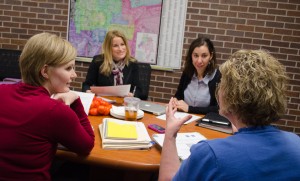 During these first few weeks of teaching, amid several other forms, you’ve probably been asked to turn in your own professional development plans for the 2014-15 year. Chances are, though, your focus is on those day-to-day tasks.
During these first few weeks of teaching, amid several other forms, you’ve probably been asked to turn in your own professional development plans for the 2014-15 year. Chances are, though, your focus is on those day-to-day tasks.
I know. You just finished your college degree. But, it’s important that you continue to learn throughout your journey as a teacher.
Your district and school will probably be providing a variety of professional development opportunities for you…in the form of speakers and workshops during in-service days. When the students clear out of the building, it’s time for you to learn.
While districts usually have a significant portion of their budgets set aside for professional development, they’re also limited—budget, time, and content constraints—as they try to provide learning opportunities for such a variety of faculty needs.
It’s really important that you take a little time to plan what you’d like to and need to learn through the year—including over the summer (which will be here sooner than you think!). It’s a great way to figure out what would help you improve as a teacher.
“Attend at least one professional development event every summer,” recommends Dr. Tom Vontz, Elementary Social Studies. “Most are free and many are interesting. Stay connected, my friends.”
So here are some possibilities to make sure you take care of yourself as a “student” of teaching—all designed to help increase your students’ learning by making you a better teacher:
- Meet with your administrator, department chair, mentor, or a veteran colleague for a conversation about your professional development needs. Determine areas you need to strengthen in your knowledge and teaching skills, whether that’s implementing the new Common Core standards, developing content-specific approaches, or using the latest in technology.
- State organizations are a great way to start getting involved, and some are free to join…or offer free or discounted membership for new teachers; be sure to ask! Consider joining these:
- Literacy: Kansas Reading Association (all grade levels)
http://www.kansasread.org/join.html - Math (elementary and secondary): Kansas Association of Teachers of Mathematics
http://www.katm.org/baker/pages/membership.php - English/Language Arts (secondary): Kansas Association of Teachers of English
http://www.kansasenglish.org/memberships - Social Studies: Kansas Council for the Social Studies
http://www.kcss.info/node/6 - Social Studies: Kansas Council of History Education
http://www.ksche.org - Science: Kansas Association of Teachers of Science
http://kats.org/membership-2/ - Music: Kansas Music Educators Association (all grade levels)
http://www.ksmea.org/membership/
- Literacy: Kansas Reading Association (all grade levels)
- Scout around for affordable conferences or workshops that fit into your professional development plans. Target a specific area that you want to address and look for opportunities to learn more about that topic.
- As you work toward renewing your teacher license, consider taking a graduate class. http://coe.k-state.edu/grad/index.html
- Do the reading! Find a journal (possibly from one of the state or national organizations in your content area or grade level). Budget tight? Then check with your building librarian/district curriculum director.
- Find other valuable resources—for lesson plan ideas, webinars, etc., such as ReadWriteThink.org, a website supported by the International Reading Association and the National Council of Teachers of English: http://www.readwritethink.org
- The National Council for Literacy Education focuses on literacy at all grade levels and in all content areas. Visit their Literacy in Learning Exchange (http://www.literacyinlearningexchange.org/home) and sign up for their NCLE SmartBriefs (https://www2.smartbrief.com/ncle/index.jsp?utm_source=brief), which provides literacy-related news for educators, administrators, and education advocates.